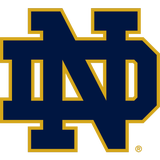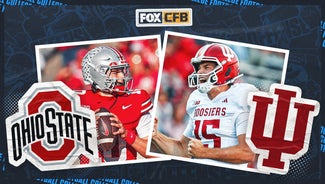
Brian VanGorder's firing deserved yet insufficient to fix Notre Dame defense

Brian VanGorder’s firing as Notre Dame defensive coordinator Sunday was many things. Belated, yes. A relief for apoplectic fans, sure. Above all, it was deserved, a thoroughly merited result of running a cataclysmically bad unit that has trended unmistakably downward ever since the middle of the 2014 season.
Through four games this fall, Notre Dame has allowed 134 points. No previous Fighting Irish team has allowed that many points in its first four games. For VanGorder, a relationship with the head coach that dates to the 1980s goes only so far when you’re paid more than $1 million a year and make middling quarterbacks look fit for Hall of Fame busts.
“When you’re 1–3 at Notre Dame,” head coach Brian Kelly said Sunday, “changes are going to be made.”
Here’s the insidious truth for anyone anticipating a sudden healing, or resurrection: No one can change the real problem with Notre Dame’s defense for the rest of this season and probably a little while beyond it. There are not nearly enough difference-makers available on this roster, thanks to recruiting miscalculations or mistakes that are two or three years old. Those errors were followed by very problematic personnel attrition. Where there should be reliable veterans or budding stars stepping into the spotlight after a couple years of development, there is mostly mediocrity. The high-end talent just isn’t there. So it’s somewhat ridiculous to think a coaching change will generate high-end performances out of, basically, nothing.

Kelly’s dilemma, of course, is that he could no longer profess to be doing right by this team while still employing VanGorder, whom he’s known since his Grand Valley State days. Notre Dame ranks 103rd nationally in total defense, 101st in scoring defense, 98th in yards allowed per play, 88th in turnovers gained, 96th in rushing defense, 111th in pass efficiency defense and 114th in tackles for loss per game.
After a loss to Duke on Saturday in which the Blue Devils scored more points (38) than they had in their previous two games against Power 5 foes combined (27, total, in losses to Wake Forest and Northwestern), Kelly declared that coaching wasn’t the problem. Only a fool would believe he changed his mind overnight; indeed, Kelly said he was “evaluating everything” after a season-opening loss to Texas that represented the program’s third defeat and prominent defensive face plant in a row dating back to the end of last season.
Kelly said he gave “no consideration” to parting ways with VanGorder after 2015. Doing so would have been a tough call that nevertheless demonstrated necessary foresight. Instead, the Fighting Irish’s coach protested and evaded as long as he could before he had no excuses left.
Only he doesn’t have much left after that, either. For this—for a problem that runs deeper than the guy wearing a bright green pullover on the sideline—Kelly and his staff can only blame themselves. Mostly, anyway.

In the recruiting class of 2013—players who would be fourth-year veterans now—Notre Dame signed three five-star defensive prospects. One, linebacker Jaylon Smith, left for the NFL after his junior season. Another, safety Max Redfield, was kicked off the team in September following an arrest. The last, defensive lineman Eddie Vanderdoes, never made it to South Bend, backing out to ultimately sign with UCLA. To boot, Notre Dame inked a quartet of four-star prospects that year, and one of them, linebacker Doug Randolph, has had his career cut short by injury.
In 2014, Notre Dame signed zero five-star defensive prospects and just three four-star recruits on that side of the ball.
So, in sum, this leaves the Fighting Irish’s defense in 2016 with six former four-star recruits among its junior and senior classes. Six. Total. These are the groups that must be the unshakable foundation for a team. And, for a number of reasons listed above, Notre Dame’s depth of experience and game-breaking talent in those classes is effectively non-existent.
It’s perhaps most profoundly and fundamentally an issue in the trenches. Kelly’s early Fighting Irish teams featured multiple future NFL draft picks along the defensive front; between 2013 and 2014, just two four-star defensive linemen, Isaac Rochell and Jay Hayes, reached campus. Therefore it is perhaps no surprise that Notre Dame ranks last in the country with just one sack this season.

We can debate the merits of recruiting rankings endlessly. We’ll concede that coaches regularly coax high-level performance out of high school players with less eye-grabbing profiles. But for Notre Dame in 2016, this is no coincidence. The players who were supposed to make a difference defensively this fall aren’t around anymore. Or they never arrived in the first place. And the coaching staff couldn’t squeeze excellence out of what was left. From whatever perspective, when Kelly and his coaches absolutely had to restock this defense via recruiting and/or development, they ended up almost empty-handed.
So Kelly and new defensive coordinator Greg Hudson will be seeking decisively better results with players who, for the most part, haven’t even hinted at being elite college defenders. It’s a massive ask.
The 49-year-old Hudson, who was on staff already as an analyst and who has run defenses at Minnesota, East Carolina and Purdue, is an affable guy and a good coach. He’ll inject personality and positive vibes into the room. Notre Dame’s players will like him. And all of that would be a marked improvement from where the defense was before the switch. “I thought Greg was the perfect fit to bring that energy level up to where I want to see it,” Kelly said Sunday. “Guys play hard. But we lack some of the energy and enthusiasm and fun, quite frankly, that you need to have when you’re playing on defense.”
Kelly said he wants his players to “play fast and free and loose.” He said he wants them to stop performing “so mechanical and robotic.” None of this, though, necessarily translates into becoming inherently great college defenders. Or even good college defenders. Maybe at this point Notre Dame would settle for not awful.
But that’s a depressingly low bar, and it seems like those hollering for VanGorder’s dismissal believed that one move would have otherworldly restorative powers. It probably won’t. Firing VanGorder was necessary and also not enough. Notre Dame doesn’t have the parts required to fix this, not in the way anyone hopes it will be fixed.
Meanwhile, between the Irish’s true freshman class and the current lot of commitments from high school seniors, there is one top-100 defensive prospect on board: Daelin Hayes, a first-year linebacker already on campus. No, the change Notre Dame’s defense truly requires isn’t limited to the change it made Sunday.










